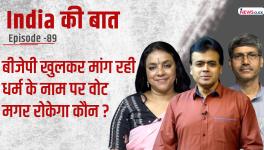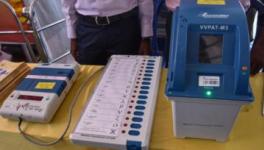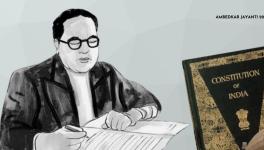Porn Ban: Violation of Constitutional Rights for Moral Policing
Newsclick interviewed Prabir Purkayastha, Chairperson of the Society for Knowledge Commons on the recent issue of porn-ban by the Government of India. Purkayastha said that pornography is an age-old issue and the society has to take a final call on this. Hence, it would be untimely to ban it. He cited that the principle behind the enforcement of bans itself as a problem. The government, in banning porn, is going beyond the Supreme Court directive and the Constitution line, by treating private players as intermediary owner. Banning porn is also a practical problem since because of the availability of different proxies and IP options. Purkayastha, however, stressed that there can be no debate on the banning of child porn as there is a consensus on that issue.
Rishab Bailey - Hello and welcome to Newsclick. On 31st July, the Central Government ordered Internet Service Providers (ISP) in India to block around 857 websites supposedly carrying pornography. The govt decision to act as a moral police of course lead to a lot of debate on the issue of freedom speech on particularly on the context of Internet. The ISP industry and large parts of civil society have come out against the ban with intermediaries pointing in particular to how they been put in a adjudicatory position something that they are not equipped to do. To discuss these issues, we have joined with Prabir Purkayastha, Chairperson of the Society for Knowledge Commons and editor of Newsclick.
Hi Prabir, thanks for joining us today. Given that the Supreme Court has not passed any specific orders directing the govt. to block pornography websites and further that watching pornography in India in private is not per say illegal, why do you think that the gov.t is taken to action? So you think that this is part of larger cultural moral policing by the right wing or do you think this is something that legitimately within the govt's. purview to take action on this?
Prabir Purkayastha - Well, I think the trigger was the Supreme Court talked about Child pornography and something to be done and child pornography is obviously sensitive issue. But the rest of it, a mass blocking of pornography cites clearly is reaction and it is governed by, essentially moral policing as you are saying or what others have said. So it is very clearly moral policing and it is problems of various kinds because what constitute pornography itself has been a long debate for the ages and if what is being talked about pornography sites and so on, a lot of them actually are not, bulk of them probably are. So this is really getting down into this level; trying to identify sites, asking ISPs to do various things, I think is also a long term problem because it doesn't only pertain to pornography, which is always starts first but it could also go on to say now extremism will ban, other things we will ban. So I think the principle of ban itself is a problem and it always starts with pornography, so that’s where it really starts, wherein quite often spins over to other things. That’s the threat we have.
Rishab - Now there are two basic issues that play here. First is the issue of whether pornography itself is harmful to society or not, whether this should be taken care of in one way or other way that banned or not. And second is the issue of this specific order which resulted in the blocking of 857 sites, whether this is in consonance with the extend legal frame work. What is your stance on this issue? I mean, how would you look at dealing with the issue of pornography, particularly given that the child pornography as you said generally consensus that you should ban it?
Prabir - I think child pornography is always exception which almost all countries have exempted should be banned. And the question is even watching child pornography, downloading child pornography, many jurisdictions, it is banned. That I think relatively much clearer issue and which there is a broad census except perhaps United States, where it is still what can or cannot be done is a different matter. UK, it is even harder that In fact UK's laws are and the practices are even much worse than any of the other, for instance countries in Europe or most countries in Europe. So I think the issue of child pornography is settled and the issue of pornography I think it is very clear that the general tendencies to go to a much more relaxed environment on the child pornography or watching pornography. And it also is something part of Indian culture because after all if you really ban what is called quote, unquote pornography, would you ban Kajuraho, would you ban Konark, would you ban Kamasutra and so on. So I think that we need to really much more sensible about these issues and it also interesting for me that while we are quite happy to talk about banning pornography but we don't talk about banning for instance extreme violence we see on the movies, that is taken as norm. So I do think that these things are much more problematic interns of dealing with bans and society has the right to finally decide as a part of its norms. What it is considered should be watched or should not be watched and let the people decide much more individually than a social bans.
Rishab - Moving on the second issue. The websites that have banned this time, it appears even not blocked under section 69A, which is the provision that actually allows the govt. to go and block the content viewed by the public but under section 79, which is the provision that supposed to ensure intermediaries are not hell liable for content, they just help users' access. So do you believe that the govt's actions in issue in this order under section 79 of the IT act are valid?
Prabir - I think it is very very important issue which is not really received the amount of attention it deserves. The issue from the beginning has been with the section 79, that it can put the owners of the censorship on the intermediaries, which is what by law should not be done because the right of censorship and review by the court is fundamental to the section 19 of the Indian constitution, which is freedom of speech and reasonable restrictions thereof. It is not for commercial enterprises to look at these issues in that framework. So putting anything to be blocked under 79 is really allowing state powers to be given to private entities to be exercised and under the threat of what the 79 is withdrawal of safe harbor. The intermediary protection was that if you carry things, which you have not generated yourself, you have safe harbor if you follow certain provisions. And from the beginning, Knowledge Commons and you are part of that already talked about how this itself so vaguely worded that it can lead to ultimately asking the intermediary to exercise censorship powers and thats what seems to have been done by this order because first they asked them to block, which is relatively threat of withdrawal of safe harbor. Now what they asked is, you decide whether the child pornography or this 857 sites, and you decide what is to be blocked or not. This is straight forward giving up govt censorship powers to intermediaries under the threat of safe harbor I think that is unacceptable.
Rishab - Now as you just mentioned section 79 of the act provides that the intermediary should take action to take down content if it has knowledge that its furthering an illegal activity but the Supreme Court in the recent Shreya Singhal judgment read down this provision to specifically say that the intermediary only need to act if it receives knowledge of an illegal activity based either on a court order or a govt. notification. This appears to be a sort of loop hole that the govt is taking advantage of in this case because it purportedly given intermediary notice , that there is an illegal content. Thereby they put the owners as you rightly say on the ISPs to take adjudicatory action. So do you think that the govt is actually acting in accordance with the Supreme Court dictate or it is violating Supreme Court's order?
Prabir - Supreme Court also said specifically what are the conditions under which the govt should issue this blocking order. And it said, certain threat of integrity of the country, incitement to violence, etc. which are very much part of 92, reasonable restrictions. Now this actually court did not mention pornography, obscenity which is also could be constituted as reasonable restriction. Court didn't actually mention it. So this I think If you look at the Supreme Court order, this is going beyond what is Supreme Court had ordered. So I don't think that loop hole exists in the order the way you are saying. Essentially it was that the govt allowed that 69A blocking provisions to be retained. It didn't also talk about 79. So I think this two things have to be seen together that essentially 69A, the Supreme Court accepted certain things can be blocked. If it confirms to 92 reasonable restrictions and it also said only certain items of 92 reasonable restrictions, it didn't say everything in that but it could be argued that it is a whole 92 reasonable restrictions, as obscenity also comes into that but it did not suggest that the safe harbor linked to it. I think this extension of this argument to saying withdrawal of safe harbor and putting the adjudicatory responsibility on the intermediary, I think it is going far beyond the Supreme Court had ordered.
Rishab - Similar to the previous instance of blocking which we saw few months, about five or six months ago involving git hub and so on, the govt is once again ordered all ISPs to keep the blocking order confidential. The Supreme Court in the Shreya SInghal case again has specifically noted the various safeguards present in the law in the blocking content under 69A so for instance, you are hearing to the other party, there are multiple layers of review and so on. So these condition one would think that have not been followed in this particular case, given that the govt is gone under 79. So why do you think there is a wale of secrecy over govt actions, particularly in this day, when it is practically impossible to keep this out of the situation.
Prabir - You know it is very interesting issue that you are raising. The govt's instincts always seems to be keep everything secret, unless it is forced to release it. Thats the way the govt's seems to operate, which does operated in this case and obviously as you say these things given the fact that you are giving notices to so many ISPs, this is impossible to really keep the secret. But the principle of it really the Supreme Court should have been laid down, that of making the order public, rather they are saying redressal by the affected parties, because then its only those who are running the websites who get that readressal but nobody else does. So I think the Supreme Courtheard in that order by not saying any such order should be made public. And giving therefore the govt is leaving this to cover this up and making into much more difficult for to get the information though as we all know this information really leaks out pretty soon, particularly in India.
Rishab - Now, finally in today's day in age, I think it is important to consider the practicality of any of these bans. You already mentioned that in theory, we should not undertake ban of this nature, but is it practical to actually enforce any kind of ban of this sort and what to other countries do about these sort of instances?
Prabir - You know there of course different levels of approach that different countries that are taking. First, is it technically to ban, I think it is almost impossible to impose a ban of this order because a) from the user, you have now tools like proxy servers, you can go to the anion router, the Torp route, by which all these would anyway can bypass. And any young person, at the age of 13 which is suppose to be at12-13, they actually seem to know more about than their parents do. So it is almost impossible to prevent children from doing if they want to. So you have to teach them what is good and what is bad instead of trying to block so that is one. The second part is, this is even more difficult exercise, that the porn site can continuously change their IPs, their names and so on. And it is almost again if you start to put things under ground, it is almost apart from criminalizing, almost impossible really stop it because criminalizing takes place abroad and doesn't take place in your own country. There is not much that the police in any country can do. So either you deal with it as an international issue and have an international understanding on it which everybody agrees to, which is rather difficult on the issue like this because cultural morals are more different from US to Turkey to China to England and forget all these, even from US to UK, there is a huge difference in approach that seems to have been taken. So I think that international accord is going to be difficult and I don't see that technologically it is possible we need to hold the wall as the govt wants to do indefinitely.
Rishab - Well thats all the time we have today. Do join us again in another episode on Newsclick.
DISCLAIMER: Please note that transcripts for Newsclick are typed from a recording of the program. Newsclick cannot guarantee their complete accuracy
Get the latest reports & analysis with people's perspective on Protests, movements & deep analytical videos, discussions of the current affairs in your Telegram app. Subscribe to NewsClick's Telegram channel & get Real-Time updates on stories, as they get published on our website.
























